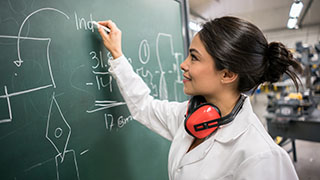
Patrick Richardson, a rising senior at Essex High, has autism and is considered nonverbal. He can beatbox, sing, and hum — and frequently does — but speaking is difficult.
At school, he used to receive a slew of specialized supports. He met often with a case manager, and he also got regular physical therapy. Most crucial, though, according to his mother, Melissa Bronson, was the speech therapy he got four times a week.
When the pandemic forced classes to go online in the spring, Bronson said the school did check in often, and tried to find ways to deliver his services remotely. But Patrick had a hard time understanding why he was expected to do schoolwork from home, and, especially where speech is concerned, he lost a lot of ground.
“It’s not his fault. It’s not their fault. It’s just he doesn’t have that structure that the school provided,” she said.
When schools closed their doors in the spring, thousands of special education students in Vermont lost access to the individualized, often intensive supports they relied on at school.
Educators did what they could to adapt special education plans to remote learning, and advocates say some students even thrived. But virtual school was inadequate for most, and many students with disabilities noticeably regressed.
With classes starting again next week, schools face the difficult task of making students whole. And how to do that for students who need special education remains an open question.
“Just about all parents are in some degree of panic over what’s what’s going to happen,” said Karen Price, co-director of family support at the Vermont Family Network.
When a school fails to deliver on its obligations under a student’s individualized special education plan, a judge or hearing officer will often order that “compensatory services” be provided to make up for the services a student lost out on.
VTDigger is underwritten by:
Many advocates say that framework makes sense, and should be applied here. But the approach makes special education administrators nervous; they argue it assumes fault when schools were doing their best under unprecedented circumstances.
In July, the Agency of Education released guidance distinguishing between compensatory education and “Covid-19 recovery services.” The latter, the state said, should be awarded when a student with disabilities didn’t make progress or regressed, even if schools adapted special education plans appropriately while schools were closed.
The state guidance has caused much angst among both advocates and special education administrators, although for opposite reasons.
Advocates worry “Covid-19 recovery services” could be used to circumvent a stronger right to compensatory education. Administrators, meanwhile, believe it creates an entirely new entitlement for schools to fulfill.
“It is above and beyond federal law, from my perspective,” said Erin Maguire, the director of equity and inclusion in the Essex-Westford School District.
Maguire said it’s indisputable that schools need to be thinking about “repair and support and intervention.” But she says educators need to have a broader conversation, outside the narrow construct of federal disability law, about how all students were shortchanged by remote learning.
“I think we need to be more holistic about it,” she said.
‘Artificial safe harbor’
Marilyn Mahusky, a staff attorney with Vermont Legal Aid’s Disability Law Project, says the distinction between compensatory and Covid-19 recovery services is “arbitrary and artificial,” and argues the state’s reasoning assumes, incorrectly, that the pandemic changes what students are entitled to under federal law.
“Essentially, the agency is relying on what we think is an improper legal standard,” she said.
She also believes that, when push comes to shove, if families challenge what they think are inadequate remedial services in lawsuits or due process complaints, districts will find they don’t have the legal cover they thought they did.
“I think it is really creating an artificial safe harbor for schools,” she said. “And I’m afraid that might backfire on school districts.”
In an email, Agency of Education spokesperson Ted Fisher said Covid-19 recovery services are not a new entitlement and do not weaken rights to compensatory education.
Rather, those services are “intended to ensure that the context of Covid-19 is applied to conversations about how to meet existing (obligations under federal law) to students with disabilities,” he wrote.
While the agency’s attempt to differentiate between compensatory and “Covid recovery services” might be well-intentioned, the “differentiation is not all that clear,” said
VTDigger is underwritten by:
Perry Zirkel, a professor emeritus of education and law at Lehigh University, who frequently blogs about special education.
“The calculation of (Covid recovery services) can eventually cause even more litigation in terms of not only whether the determination is appropriate, but also whether or to what extent it fulfills any entitlement to compensatory education,” he wrote in an email.
And if neither the federal government nor the state ponies up additional money for these services, schools could be left in the lurch.
“Without extra funding, (Covid recovery services) ultimately allocates local school resources, which are already reduced due to added expenditures for technology and safety equipment/services and lower tax revenue, from future to past needs,” Zirkel wrote.
What’s ‘appropriate’ in a pandemic?
Even in non-pandemic times, special education is one of the most high-stakes programs in preK-12 schooling. Services can be incredibly expensive, the specialists needed can be tough to find, and schools and parents are often at odds about what a student needs.
Special education services are mandated by the federal Individuals with Disabilities Education Act, which requires school districts to provide a “free and appropriate public education,” often referred to as FAPE. That standard is intended to ensure students with disabilities get the accommodations they need to gain learning opportunities equal to their peers.
Many advocates believe the issue is straightforward. If children don’t receive services, then they don’t have a free and appropriate public education, and are entitled to compensatory education.
“It should be an irrefutable presumption that students who were unable to access remote education are to automatically be awarded compensatory education,” the Council of Parent Attorneys and Advocates, a national disability rights advocacy group, wrote in a recent position statement.
But others counter it’s not so simple.
“When schools closed and completely altered themselves in the way they did in the spring — it does change the definition of FAPE, because FAPE is related to the access to general education,” said Maguire, who’s also president of the Council of Administrators of Special Education, a national professional organization.
Mark Oettinger, a former general counsel for the Vermont Agency of Education who’s now in private practice, agrees the crisis fundamentally changes things, and what constitutes FAPE “is not cast in stone.”
“FAPE is a free and appropriate public education. And so the question is, what is appropriate in a global pandemic?” he said.
A tale of two sons
Katie Ballard, a parent in the Essex-Westford District and a disability rights advocate, said her own sons, both of whom have special education plans, had diametrically different experiences when schools went virtual.
Her 13-year-old son “probably made the most academic progress he’s ever made,” she said. He received specialized, one-on-one tutoring while working from home, and not going to school allowed him to work at his own pace and lessened his anxiety.
But her elementary-age son, Noah, was a different story. He threw tantrums and refused all academic work outright.
“I probably cried every day. And he had a pretty robust service plan from his team,” Ballard said.
Heading back into the school year, Noah’s school has agreed to a series of intensive services, and will have him back in school five days a week, even though the district is adopting a hybrid model for general education students.
“They’ve basically said, you know, nothing’s off the table. They really recognize that he made no progress,” she said.
Ballard said she’s grateful her child’s service team was proactive and collaborative about addressing his needs as school reopens. But she notes families she’s helped in other districts have had to request services using the compensatory education framework, and it’s clear that often makes school officials defensive.
“People get a little bit uncomfortable,” Ballard said.
She said she’s not sure which tack is best, although she’s sympathetic to the argument that FAPE probably changes when all students experience a generally degraded educational experience. And she thinks that what really matters, at the end of the day, is whether kids get the help they need.
“We may not agree or disagree with the definitions and terminology, but I think it’s been pretty clear that teams understand that there was significant regression due to Covid,” she said.
If you want to keep tabs on Vermont’s education news, sign up here to get a weekly email with all of VTDigger’s reporting on higher education, early childhood programs and K-12 education policy.





More Stories
Launch of Altura – a Blended Learning Solution from Macmillan Education India
How education can succeed in times of crises
Abdul Aziz Al Ghurair Refugee Education Fund Partners with Discovery Education